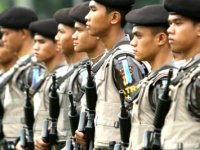Case File
Smith & Wesson’s Foreign Bribery Settlement

Contents
Introduction
Introduction
contentsIn 2014, the U.S. firearms manufacturer Smith & Wesson agreed to pay USD 2 million in fines to settle an investigation by the Securities and Exchange Commission (SEC) into foreign bribery conducted by the firm’s international sales team between 2007 and 2010. The investigation established that Smith & Wesson employees made “systemic” use of bribery during this period to establish the 155-year-old company in foreign markets. The company masked these bribes, offered to officials in Bangladesh, Indonesia, Nepal, Pakistan, and Turkey, in its accounts as legitimate expenses. In Pakistan, Smith & Wesson was able to win a contract worth USD 210,980, about half of which was profit for the firm. Amaro Goncalves, Smith & Wesson’s vice-president of international sales, was the key decision-maker in these various schemes.
Case Details
Case details
contentsActors
Actors
contentsAmaro Goncalves – vice president of international sales at Smith & Wesson. Previously indicted in a sting investigation; not charged in association with the Pakistan case.
Allegations
Summary of Corruption Allegations
contentsThe SEC settlement alleged that Smith & Wesson had paid out or authorized payments it knew would be used to bribe foreign officials in all five countries. In the case of the Pakistani deal, Goncalves authorized a local agent to gift USD 11,000 in guns to police officials, on top of additional cash payments. In Indonesia, the firm made payments to an agent in the knowledge that these would be passed to police officials, disguised as inflated reimbursements for firearms lab testing costs. Smith & Wesson made payments in the Turkish case as well, but only went so far as to authorize payments for the Bangladesh and Nepal deals.
Timeline
Timeline
contents- The deals named in the SEC investigation involved five countries. In Pakistan, Smith & Wesson won a contract to sell 548 pistols to a police department for USD 210,980, but in each of the other cases the contracts were never finalized. In Indonesia, a local agent failed to secure the company a police firearms contract; in Turkey, Smith & Wesson lost a bid to sell handcuffs to the Turkish police while a second contract to provide small arms to the military was cancelled. With regards to mooted deals in Bangladesh and Nepal, little is publicly known.
Outcomes
Investigation Outcomes
contents- After the U.S. Department of Justice (DOJ) investigation, 22 small arms and policing-equipment salesmen (including Amaro Goncalves, the Smith & Wesson sales executive) were indicted on foreign bribery charges.
- US DOJ investigative operation collapsed after two unsuccessful trials. According to the jury, prosecutors made number of errors, relied on unreliable witnesses, building a flimsy conspiracy theory.
- After ending its investigation, the US DOJ informed Smith & Wesson that it would not be bringing criminal charges against the firm, nonetheless, the Securities and Exchange Commission (SEC) civil action continued.
- JunSmith & Wesson agreed to pay USD 2.0 million to settle the civil charges, including USD 1.9 million in fines, USD 107,852 in disgorged profits, and USD 21,040 in interest
References
References
contents“Indictment, in United States of America vs. Amaro Goncalves,” United States District Court for the District of Columbia, Dec. 11, 2009, https://www.justice.gov/sites/default/files/criminal-fraud/legacy/2012/02/29/12-11-09goncalves-indict.pdf.
“Smith & Wesson exec charged in bribery sting,” Boston Herald (online), Jan. 19, 2010 (updated Nov. 18 2018), https://www.bostonherald.com/2010/01/19/smith-wesson-exec-charged-in-bribery-sting.
Mike Koehler, “A Guest Post From The Africa Sting Jury Foreman,” blogpost, FCPA Professor (blog), Feb. 6, 2012, http://fcpaprofessor.com/a-guest-post-from-the-africa-sting-jury-foreman.
“Order instituting cease-and-desist proceedings pursuant to Section 21c of the Securities Exchange Act of 1934, making findings, and imposing a cease-and-desist order,” in the Matter of Smith & Wesson Holding Corporation, Respondent, July 28, 2014, http://fcpa.stanford.edu/fcpac/documents/3000/002233.pdf.
Jonathan Stempel, “Smith & Wesson settles SEC bribery case over firearms sales,” Reuters, July 28, 2014, https://www.reuters.com/article/sec-smithandwesson/update-1-smith-wesson-settles-sec-bribery-case-over-firearms-sales-idUSL2N0Q30ZC20140728.
R. Daniel O’Connor, “Insights: The U.S. SEC’s Settlement with Smith & Wesson Raises New Foreign Corrupt Practices Act Concerns for Smaller Companies,” Bloomberg Securities Law (online), Oct. 7, 2014, https://news.bloomberglaw.com/securities-law/the-us-secs-settlement-with-smith-wesson-raises-new-foreign-corrupt-practices-act-concerns-for-smaller-companies.